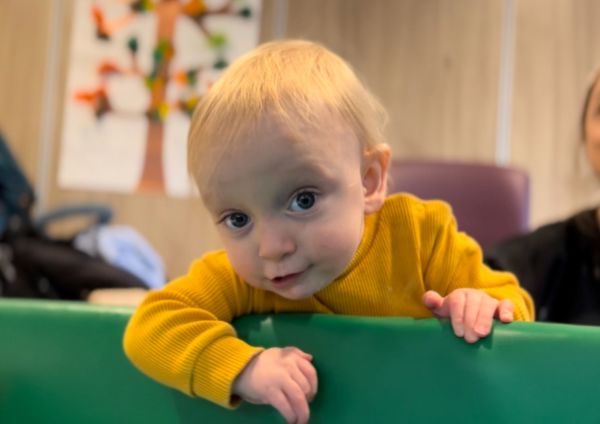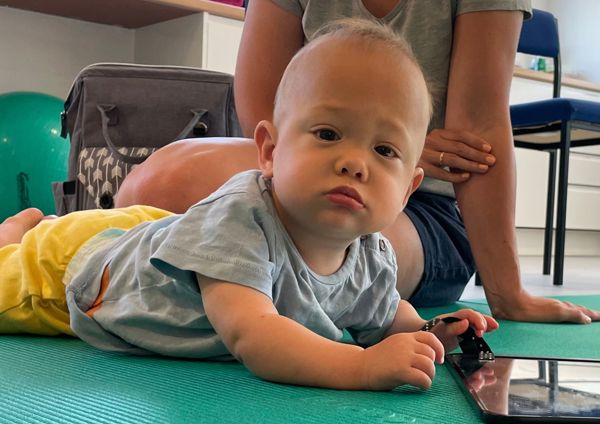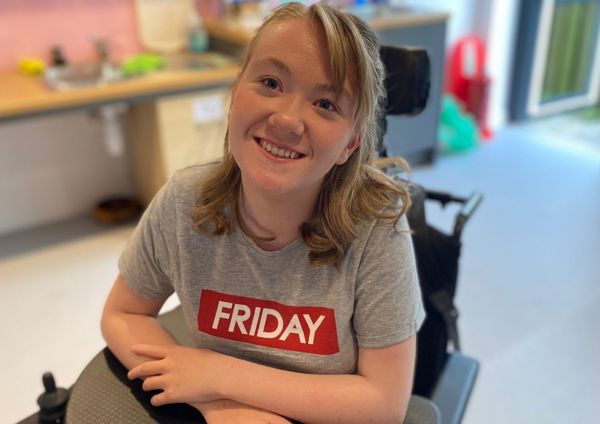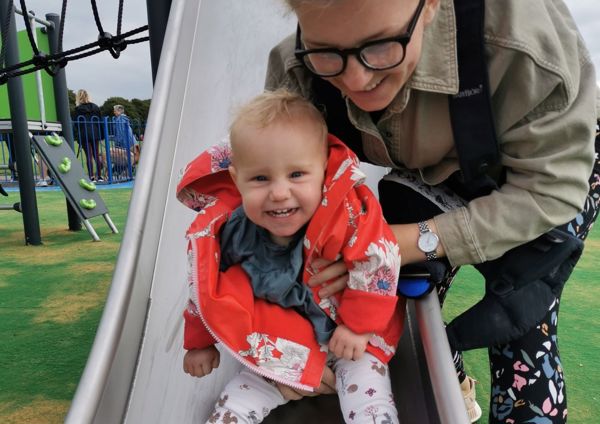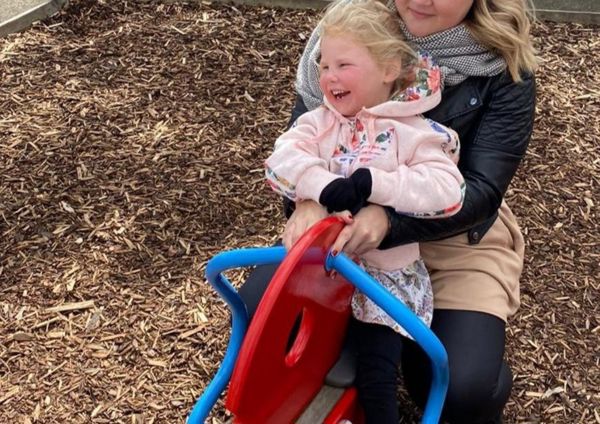First finding out
About diagnosis
There is no test for cerebral palsy it is a clinical diagnosis based on features seen in your child and their history.
If your child has had a difficult start in life, you might already have been told or be aware, that they are at high risk of having cerebral palsy.
Your GP or paediatrician will ask about your child’s medical history and development, and check for signs of cerebral palsy. A diagnosis may be made from this examination. The following scans and tests may be recommended to take a closer look at what has happened in your child’s brain to help confirm the diagnosis of cerebral palsy or rule out other conditions:
- Cranial ultrasound scan – only suitable for young babies, where a small handheld device that sends out sound waves is moved over the top of your baby’s head, over the naturally occurring soft spot (fontanelle), to create an image of their brain.
- MRI scan – a scanner that uses magnetic fields and radio waves to produce a more detailed image of the brain.
- CT scan – a scanner that takes several X-ray pictures to create a detailed image of the brain.
- Electroencephalogram (EEG) – where small pads are placed on the scalp to monitor brain activity and check for signs of epilepsy.
- Electromyogram (EMG) – where tiny needles are gently inserted into the muscles and nerves to check how well they're working.
- Blood tests to check for conditions that can cause similar symptoms to cerebral palsy.
At what age can a child be diagnosed with cerebral palsy?
How old a child is when they are diagnosed with cerebral palsy differs greatly. Some premature babies, with more marked cerebral palsy, who have spent a lot of time in a neonatal unit may receive an early diagnosis. However cerebral palsy is often not diagnosed until your child is older, when it becomes clear that they aren’t reaching their developmental milestones; such as rolling, sitting, crawling and walking.
‘High risk of cerebral palsy’
If a diagnosis of cerebral palsy is thought likely but not certain, your child might be given an interim diagnosis of ‘high risk of cerebral palsy.’ This can be just as overwhelming as an actual diagnosis so it is important to get emotional and practical support for yourself and specialist treatment for your child. Research tells us that early intervention can have the greatest impact on a child’s future outcomes. This intervention can start when your child is just a few weeks old, the sooner the better.
Who will I meet?
When you have a child newly diagnosed with cerebral palsy you often meet many professionals you have not encountered before. Below we list some and give a brief explanation of their roles.
Community Paediatrician
Community paediatricians are child health doctors trained in both hospital and community settings. They have experience of working with families and as part of a team, to assess children and coordinate services, for those with disabilities, chronic illnesses, and other special needs.
You may be referred to a community paediatrician if your child is not reaching their developmental milestones and your GP or Health Visitor thinks further investigation is required. The community paediatrician will coordinate your child’s care and may refer your child to other specialists for assessment and intervention.
Dietitian
A dietitian specialises in helping your child get the right food and nutrients for their particular needs. This can be challenging for some children with, or at risk of, cerebral palsy.
Health Visitor
The first point of contact between you and other support services is likely to be your health visitor. A health visitor will usually visit you at home for the first time around 10 days after your baby is born. Until this time you'll be under the care of your local midwives. If your baby has been in the special care baby unit (SCBU) the health visitor will become involved when your baby comes home, or a specialist health visitor may visit you on the SCBU. Health visitors are usually attached to your local GP Practice.
Orthopaedic surgeon
Orthopaedic surgeons are doctors specialising in bones, joints and muscles. Some children with cerebral palsy may develop difficulties with these as a secondary effect of their cerebral palsy and therefore be referred to an orthopaedic surgeon. Orthopaedic surgeons are involved in monitoring bones, joints and muscles as well as surgical treatment, so seeing one does not necessarily mean your child will need an operation.
Orthotist
Orthotists are specialists in orthoses (often referred to as splints) which are devices that will support, correct or attempt to correct, the alignment of joints, to improve function and/or to reduce deformities or pain. Orthoses include insoles, specialist footwear, splints and supportive garments.
Orthotists assess your child’s needs then measure, design, fit, adjust and service the orthosis. It is important to have any orthosis re-evaluated regularly to make sure it still fits, is making a positive difference to your child and remains comfortable.
Paediatrician
Paediatricians are hospital-based doctors specialising in the care of children. You may meet a paediatrician in the hospital if your baby is born unwell, prematurely or develops difficulties.
Paediatric Neurologist
Paediatric neurologists are doctors specialising in disorders affecting the brain and the nervous system. Not every child who has cerebral palsy will be seen by a neurologist, but many will be. Paediatric neurologists can be involved in diagnosing cerebral palsy, ruling out other conditions or advising on management of your child's condition.
Paediatric Occupational Therapist
Paediatric occupational therapists apply specialist approaches and techniques to maximise a child's engagement, achievement and independence in all activities, including those at school, play, leisure and self-care skills such as dressing and feeding.
Paediatric Physiotherapist
Paediatric physiotherapists use specialist knowledge of movement and child development to help children achieve their optimal physical development, so they can play, learn, have fun, and join in with friends and family life. The paediatric physiotherapist will also consider the long term impact of how your child is moving.
Physiotherapists and Occupational Therapists’ roles often overlap and they often work together on some goals.
Speech & Language Therapist (SLT)
Speech and Language Therapists are specialists in communication (not just speech) and eating and drinking and they help children develop these skills as effectively and safely as possible. As these are specialist areas, in Wales your child may see one SLT for help with eating and drinking and another for help with communication.
How Cerebral Palsy Cymru can help
Finding out that your child has or might have cerebral palsy can be overwhelming. Often families are not sure where or who to turn to to get support.
How we can help
We are a specialist centre in Wales providing therapy for children who have, or are suspected of having, cerebral palsy. We were set up by families for families. Our physiotherapists, occupational therapists and speech & language therapists are experts in cerebral palsy and will work closely with you and your local team to understand and support the individual needs of your child and family.
Our Family Support Coordinator, Natasha, is the first point of contact at our centre if you have concerns about your child. Natasha is there to support families on their journey.
If you live in Wales and your child is under the age of two, you are eligible to join our early intervention service, Better Start, Better Future. At Cerebral Palsy Cymru you can access our service whether your child has a diagnosis or not. Please read more about how you can access our services.
How we have helped in Wales
73
Family support appointments took place in 2023-24
301
Children from across Wales have been treated during 2023-24
1121
The number of sessions of specialist therapy we delivered in 2023-24

Therapy and support for children and their families
Cerebral Palsy Cymru is a registered charity in England and Wales 1010183. A company limited by guarantee. Registered company in England and Wales 02691690. Registered address: Cerebral Palsy Cymru, 1 The Courtyard, 73 Ty Glas Avenue, Llanishen, Cardiff, CF14 5DX.


